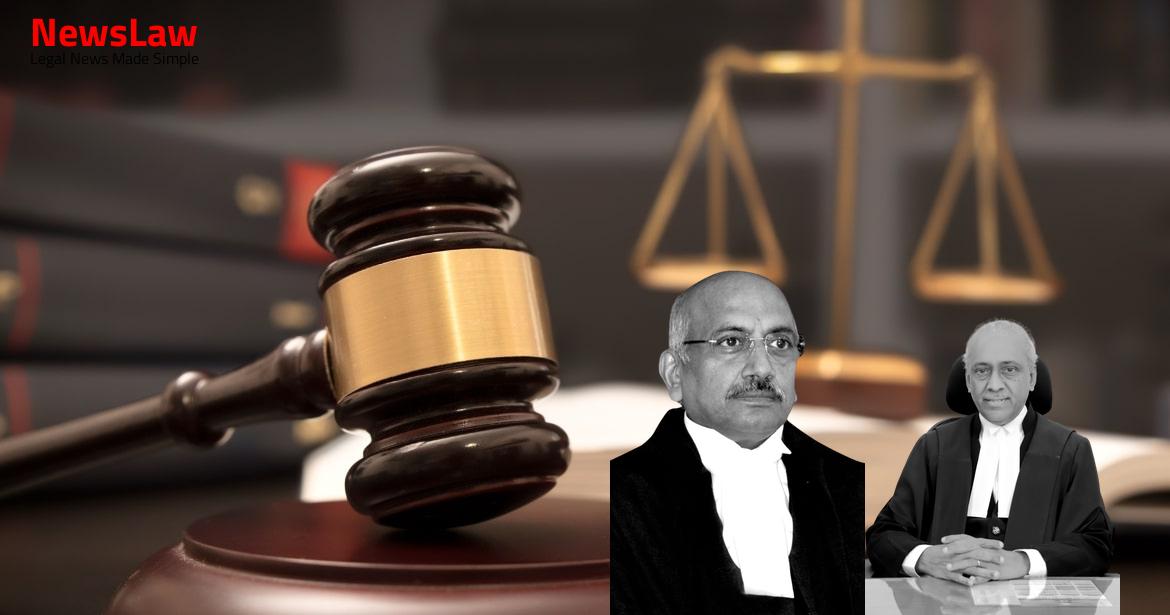Exploring the legal proceedings involving Mr. Fareed Ahmad Tak, this case summary delves into the Supreme Court of India’s decision to uphold public interest. The judgment emphasizes the need for transparency and accountability in government service, ensuring the ethical conduct of individuals like Mr. Fareed Ahmad Tak. Stay informed about the principles of natural justice and the significance of upholding integrity in public institutions.
Facts
- The Committee comprising of top government officials recommended the retirement of Mr. Fareed Ahmad Tak from government service due to his involvement in corrupt practices and causing loss to the State exchequer.
- The officer, who held a post in the Power Development Department, was found guilty of preparing fraudulent bills and misusing his official position for personal gain.
- Mr. Fareed Ahmad Tak was retired from service under Article 226(2) of J&K CSRs in the public interest, as he was deemed to have outlived his utility to the public.
- The officer’s reputation was tarnished due to embezzlement of Government funds through dishonest practices, leading to the loss of State funds.
- The Annual Confidential Reports of the officer were not available, indicating a lack of performance evaluation.
- A FIR was registered against Mr. Fareed Ahmad Tak under the Jammu and Kashmir Prevention of Corruption Act and the Ranbir Penal Code, leading to his eventual compulsory retirement from service.
- The Committee found Mr. Fareed Ahmad Tak guilty of making payments for unexecuted works and recording fraudulent measurements, resulting in significant financial loss to the State exchequer.
- The investigation concluded that the accusations against the officer were proved, leading to his compulsory retirement from service.
- The official order for compulsory retirement was passed on 30.6.2015, effective from forenoon of 01/07/2015.
- The actions of Mr. Fareed Ahmad Tak were deemed to be against the public interest and warranted his retirement from government service.
- The Respondent challenged the order of compulsory retirement by filing a Writ Petition.
- The State justified the action stating it was in public interest and decided by a senior officials committee.
- Single Judge of the High Court allowed the Writ Petition, stating the decision was solely based on an FIR without considering the APRs of the Respondent.
- The State’s norms regarding the integrity of the Respondent were not followed.
- State’s appeal in the form of Letters Patent was also dismissed by a Division Bench of the High Court.
- The Division Bench mentioned that the Respondent being booked by vigilance organization for accepting bribe falls under a certain case law making the premature retirement order valid.
Also Read: Anticipatory Bail Application in Different Cases: Landmark Judgment by the Supreme Court of India
Arguments
- The law laid down by the court in various decisions is very clear
- The leading case Baikuntha Nath Das vs Chief District Medical Officer, Baripada established clear principles
- The key point is summarized in paragraph no. 34 of the Baikuntha Nath Das decision
- Mr. Pramod Kumar Sharma, advocate for the Respondents, referenced past orders of this Court dismissing SLPs related to similar situations.
- The past orders were in response to judgments and orders by the Division Bench.
- These past orders serve as a relevant precedent for the current case being discussed.
Also Read: Supreme Court of India Dismisses Writ Petition on Arms Export to Israel
Analysis
- In the cases discussed, the accused were not caught red-handed while demanding or accepting a bribe.
- Compulsory retirement should not be based solely on involvement in criminal cases.
- Involvement in a criminal case does not equate to guilt, and prematurely retiring someone solely based on allegations is inappropriate.
- The decision for compulsory retirement should consider the overall performance and fitness of the employee, not just specific misconduct.
- The order of compulsory retirement should satisfy the principles outlined in Baikunth Nath Das case.
- The exercise of power under Article 226(2) was questioned in some cases by the Division Bench.
- Factors like complaints, audit paras, vigilance cases, adverse entries in APRs, ongoing inquiries, and general reputation should be considered to determine the integrity of a government servant.
- Premature retirement should not be used for reducing surplus staff or as an economic measure.
- The order for compulsory retirement of a government servant can only be passed by the government.
- The government must form an opinion that it is in the public interest to retire the government servant.
- Compulsory retirement can be initiated based on grounds like lack of integrity, efficiency, or effectiveness.
- This decision should be taken after following the principles of natural justice.
- The government servant should be given an opportunity to present their case before the decision is made.
- The Screening Committee should consider the entire service record of the employee before making any decisions.
- Government employees with doubtful integrity should be retired.
- Annual Performance Reports of Non-Gazetted employees are often not written carefully or fully available.
- Specific norms for efficiency/effectiveness should be similar to norms in the APRs of employees.
- Norms should be based on the nature of work in each department, with two to three key result areas identified for each category of employees.
- Promotion can override adverse remarks if based on merit rather than seniority.
- An order of compulsory retirement cannot be challenged solely on the basis of uncommunicated adverse remarks.
- An order can be interfered with if found to be mala fide, based on no evidence, or arbitrary.
- The entire service record, with more weight on performance in later years, should be considered before making any decision.
- The orders of sanction in the three matters reveal common features
- They highlight acts of commission and omission by the concerned individuals
- These acts led to wrongful loss to the State
- Public interest was compromised as a result of the actions
Also Read: National Task Force for Healthcare Safety: Ensuring Dignity and Protection for Medical Professionals
Decision
- The Letters Patent Appeals are restored to the file of the High Court for fresh consideration.
- The matters are remitted to the Division Bench due to incorrect premise and lack of consideration under Clause (iv) of Article 226(2).
- Judgments and orders passed by the Division Bench in LPASW Nos.182 of 2017, 159 of 2017 and 180 of 2017 are set aside.
- The appeals are allowed in favor of the State of Jammu and Kashmir and Ors.
Case Title: THE STATE OF JAMMU AND KASHMIR Vs. FARID AHMAD TAK
Case Number: C.A. No.-004563-004563 / 2019



